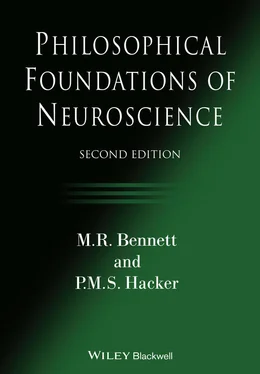Whether psychological attributes can intelligibly be ascribed to the brain is a philosophical, and therefore a conceptual, question, not a scientific one
The question we are confronting is a philosophical question, not a scientific one. It calls for conceptual clarification, not for experimental investigation. One cannot investigate experimentally whether brains do or do not think, believe, guess, reason, form hypotheses, etc. until one knows what it would be for a brain to do so – that is, until we are clear about the meanings of these phrases and know what (if anything) counts as a brain’ s doing these things and what sort of evidence would support the ascription of such attributes to the brain. (One cannot look for the poles of the Earth until one knows what a pole is – that is, what the expression ‘pole’ means, and also what counts as finding a pole of the Earth. Otherwise, like Winnie-the-Pooh, one might embark on an expedition to the East Pole.) The moot question is: does it make sense to ascribe such attributes to the brain? Is there any such thing as a brain’ s thinking, believing, etc.? (Is there any such thing as the East Pole?)
In the Philosophical Investigations , Wittgenstein made a profound remark that bears directly on our concerns. ‘Only of a human being and what resembles (behaves like) a living human being can one say: it has sensations; it sees, is blind; hears, is deaf; is conscious or unconscious.’ 13This epitomizes the conclusions we shall reach in our investigation. Stated with his customary terseness, it needs elaboration, and its ramifications need to be elucidated.
The point is not a factual one. It is not a matter of fact that only human beings and what behaves like human beings can be said to be the subject of these psychological predicates. If it were, then it might indeed be a discovery, recently made by neuroscientists, that brains too see and hear, think and believe, ask and answer questions, form hypotheses and make guesses on the basis of information. Such a discovery would, to be sure, show that it is not only of a human being and what behaves like a human being that one can say such things. This would be astonishing, and we should want to hear more. We should want to know what the evidence for this remarkable discovery was. But, of course, it is not like this. The ascription of psychological attributes to the brain is not warranted by a neuroscientific discovery which shows that, contrary to our previous convictions, brains do think and reason, just as we do ourselves. The neuroscientists, psychologists and cognitive scientists who adopt these forms of description have not done so as a result of observations which show that brains think and reason. Susan Savage-Rambaugh has produced striking evidence to show that bonobo chimpanzees, appropriately trained and taught, can ask and answer questions, can reason in a rudimentary fashion, give and obey orders and so on. The evidence lies in their behaviour – in what they do (including how they employ symbols) in their interactions with us. This was indeed very surprising. For no one thought that such abilities could be acquired by apes. But it would be absurd to think that the ascription of cognitive and cogitative attributes to the brain rests on comparable evidence. It would be absurd because we do not even know what would show that the brain has such attributes. Just compare the behavioural repertoire of a bonobo chimpanzee, a fortiori the behavioural repertoire of a human being, with that of a human brain.
The misascription of psychological attributes to the brain is a degenerate form of Cartesianism
Why, then, was this form of description, and the forms of explanation that are dependent upon it, adopted without argument or reflection ? We suspect that the answer is: as a result of an unthinking adherence to a mutant form of Cartesianism. It was a characteristic feature of Cartesian dualism to ascribe psychological predicates to the mind, and only derivatively to the human being. Sherrington and his pupils Eccles and Penfield cleaved to a form of dualism in their reflections on the relationship between their neurological discoveries and human perceptual and cognitive capacities. Their successors rejected the dualism – quite rightly. But the predicates which dualists ascribed to the immaterial mind, the third generation of brain neuroscientists applied unreflectively to the brain instead. It was no more than an apparently innocuous corollary of rejecting the two-substance dualism of Cartesianism in neuroscience. These scientists proceeded to explain human perceptual and cognitive powers and their exercise by reference to the brain’ s exercise of its cognitive and perceptual abilities.
The ascription of psychological attributes to the brain is senseless
It is our contention that this application of psychological predicates to the brain makes no sense . It is not that as a matter of fact brains do not think, hypothesize and decide, see and hear, ask and answer questions. Rather, it makes no sense to ascribe such predicates or their negations to the brain. 14The brain neither sees, nor is it blind – just as sticks and stones are not awake, but they are not asleep either . The brain does not hear, but it is not deaf, any more than trees are deaf. The brain makes no decisions, but neither is it indecisive. Only what can decide can be indecisive. So, too, the brain cannot be conscious; only the living creature whose brain it is can be conscious – or unconscious. The brain is not a logically appropriate subject for psychological predicates . Only a human being and what behaves like one can intelligibly and literally be said to see or be blind, hear or be deaf, ask questions or refrain from asking.
Our point, then, is a conceptual one. It makes no sense to ascribe psychological predicates (or their negations) to the brain, save metaphorically or metonymically. The resultant combination of words does not say something that is false; rather, it says nothing at all, for it lacks sense. Psychological predicates are predicates that apply essentially to the living animal as a whole, not to its parts. It is not the eye (let alone the brain) that sees, but we see with our eyes (and we do not see with our brains, although without a brain functioning normally in respect of the visual system, we would not see). So, too, it is not the ear that hears, but the animal whose ear it is. The organs of an animal are parts of the animal, and psychological predicates are ascribable to the animal as a whole, not to its constituent parts.
Neuroscientists’ ascription of psychological attributes to the brain may be termed ‘the mereological fallacy’ in neuroscience
Mereology is the logic of part/whole relations. The neuroscientists’ mistake of ascribing to the constituent parts of an animal attributes that logically apply only to the animal as a whole we shall call ‘the mereological fallacy’ in neuroscience. 15The principle that psychological predicates which apply only to human beings (or other animals) as wholes cannot intelligibly be applied to their parts, such as the brain, we shall call ‘the mereological principle’ in neuroscience. 16Human beings, but not their brains, can be said to be thoughtful or thoughtless; animals, but not their brains, let alone the hemispheres of their brains, can be said to see or not to see, to hear or not to hear, to smell or not to smell and to taste or not to taste things; people, but not their brains, can be said to be decisive or to be indecisive.
It should be noted that there are many predicates that can apply both to a given whole (in particular, a human being) and to its parts, and whose application to the one may be inferred from its application to the other. A man may be sunburnt, and his face may be sunburnt; he may be cold all over, so his hands will be cold too. Similarly, we sometimes extend the application of a predicate from a human being to parts of the human body; for example, we say that a man gripped the handle, and also that his hand gripped the handle; that he slipped, and that his foot slipped. Here there is nothing logically awry. But psychological predicates apply paradigmatically to the human being (or animal) as a whole , and not to the body and its parts. There are a few exceptions, such as the application of verbs of sensation like ‘to hurt’ to parts of the body – for example, ‘My hand hurts’, ‘You are hurting my hand’. 17But the range of psychological predicates that are our concern – that is, those that have been invoked by neuroscientists, psychologists and cognitive scientists in their endeavours to explain human powers and their exercise – have no literal application to parts of the body. In particular, they have no intelligible application to the brain.
Читать дальше












